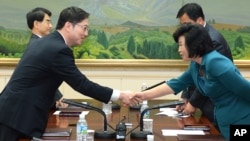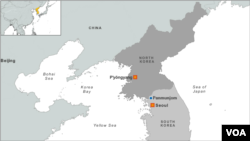After marathon discussions, South Korea has conceded to a demand from the North that dialogue to be held in Seoul this week not be termed ministerial talks -- as Seoul had earlier announced.
For the first time in years, officials of the rival governments sat face-to-face at the truce village of Panmunjom. Their talks throughout Sunday and early Monday stretched over a period of 18 hours.
After the conclusion of the marathon talks at Freedom House on the southern side of the Joint Security Area, Unification Ministry spokesman Kim Hyung-suk in Seoul read a brief statement but took no questions from reporters.
Kim said both sides agreed to call the upcoming meeting an “inter-governmental talk,” to discuss issues that should be resolved as soon as possible, such as the resumption of two stalled inter-Korean ventures in the North: the Kaesong Industrial Complex and the Mt. Keumgang tourism complex.
Kim said they also agreed they would discuss resuming meetings of separated families on the peninsula.
The spokesman added that both sides agreed to create delegations consisting of five representatives.
The chief of the South Korean delegation will be the Minister of Unification.
North Korea's official news agency later said its delegation would be headed by "minister level authorities."
There has been no dialogue at the ministerial level since 2007.
After the initial Sunday morning round of working talks, Unification Ministry officials in Seoul announced that the North had agreed to ministerial-level talks.
Last week, the communist North called for a resumption of inter-Korean dialogue after it engaged in a period of intense bellicose rhetoric and provocative nuclear and missile tests, which sent tensions on the peninsula to the highest level in decades.
Pyongyang also expressed anger about joint U.S.-South Korean annual military drills that, this year, included publicized flights of American bombers capable of carrying nuclear weapons.
The direct discussions mark a significant reversal for the North, which is under international sanctions for its ballistic missile and nuclear weapons development.
A state of war on the peninsula has technically remained in effect since 1953 when three years of devastating conflict halted with a truce but no peace treaty.
Youmi Kim contributed to this report
For the first time in years, officials of the rival governments sat face-to-face at the truce village of Panmunjom. Their talks throughout Sunday and early Monday stretched over a period of 18 hours.
After the conclusion of the marathon talks at Freedom House on the southern side of the Joint Security Area, Unification Ministry spokesman Kim Hyung-suk in Seoul read a brief statement but took no questions from reporters.
Kim said both sides agreed to call the upcoming meeting an “inter-governmental talk,” to discuss issues that should be resolved as soon as possible, such as the resumption of two stalled inter-Korean ventures in the North: the Kaesong Industrial Complex and the Mt. Keumgang tourism complex.
Kim said they also agreed they would discuss resuming meetings of separated families on the peninsula.
The spokesman added that both sides agreed to create delegations consisting of five representatives.
Tensions Rising on Korean Peninsula
Tensions Rising on Korean Peninsula- February 12: North Korea carries out third nuclear test
- March 27: North Korea cuts military hotline with South Korea
- March 28: U.S. B-2 bombers fly over Korean peninsula
- March 30: North Korea says it has entered a "state of war" with South Korea
- April 3: North Korea blocks South Korean workers from Kaesong
- April 4: North Korea moves a missile to its east coast
- April 9: North Korea urges foreigners to leave the South. The U.S. and South Korea raise alert level
- April 14: US Secretary of State John Kerry offers talks with Pyongyang if it moves to scrap nuclear weapons
- April 16: North Korea issues threats after anti-Pyongyang protests in Seoul
- April 29: North Korea holds back seven South Koreans at Kaesong
- April 30: North Korea sentences American to 15 years hard labor for hostile acts
- May 20: North Korea fires projectiles for a consecutive third day
- May 24: North Korean envoy wraps up China visit for talks on Korean tensions
- June 7: South Korea accepts Pyongyang's offer of talks on Kaesong and other issues
North Korea's official news agency later said its delegation would be headed by "minister level authorities."
There has been no dialogue at the ministerial level since 2007.
After the initial Sunday morning round of working talks, Unification Ministry officials in Seoul announced that the North had agreed to ministerial-level talks.
Last week, the communist North called for a resumption of inter-Korean dialogue after it engaged in a period of intense bellicose rhetoric and provocative nuclear and missile tests, which sent tensions on the peninsula to the highest level in decades.
Pyongyang also expressed anger about joint U.S.-South Korean annual military drills that, this year, included publicized flights of American bombers capable of carrying nuclear weapons.
The direct discussions mark a significant reversal for the North, which is under international sanctions for its ballistic missile and nuclear weapons development.
A state of war on the peninsula has technically remained in effect since 1953 when three years of devastating conflict halted with a truce but no peace treaty.
Youmi Kim contributed to this report






